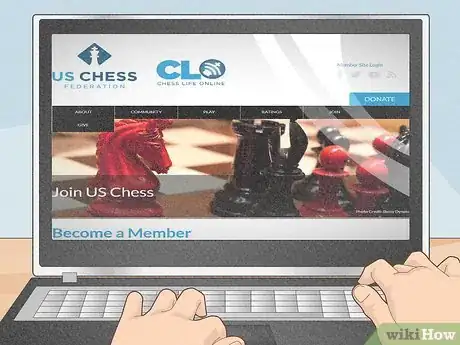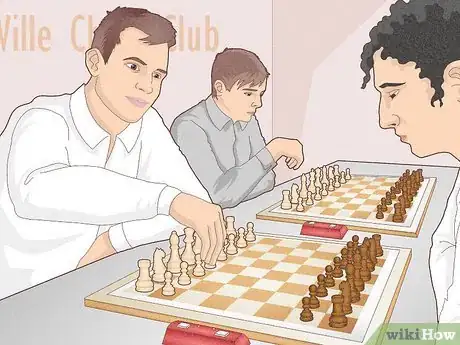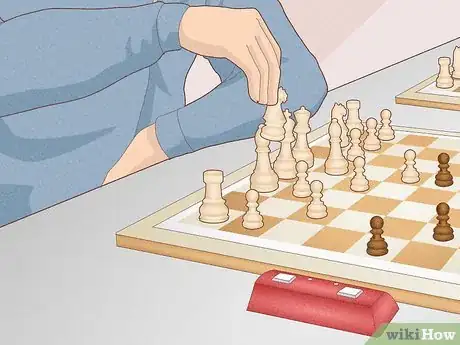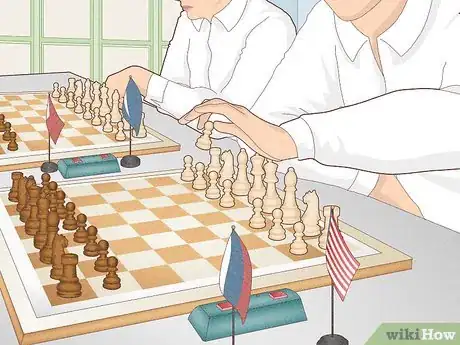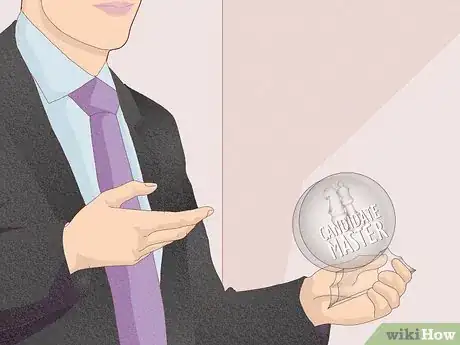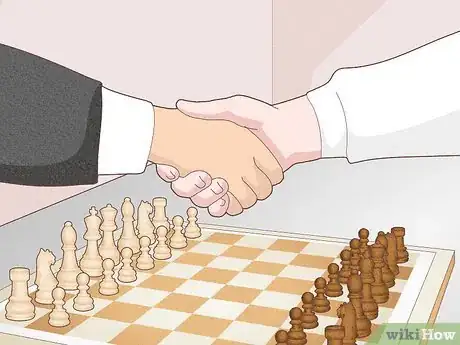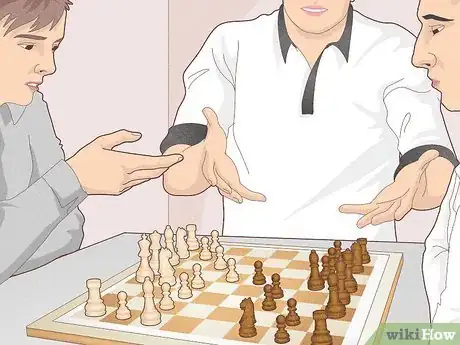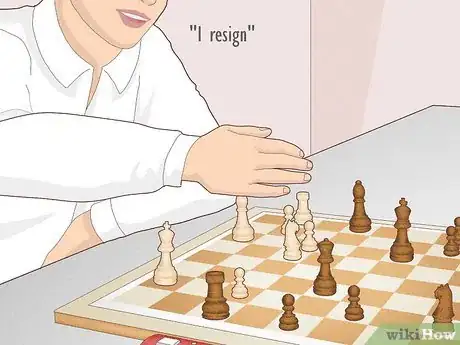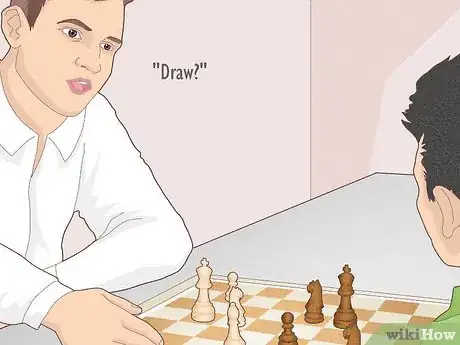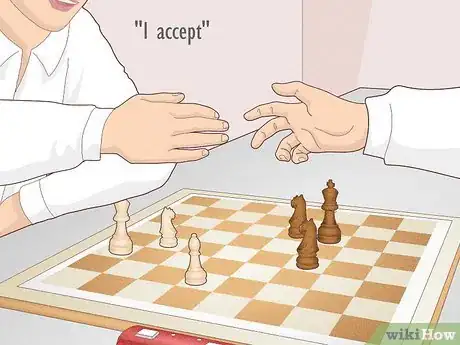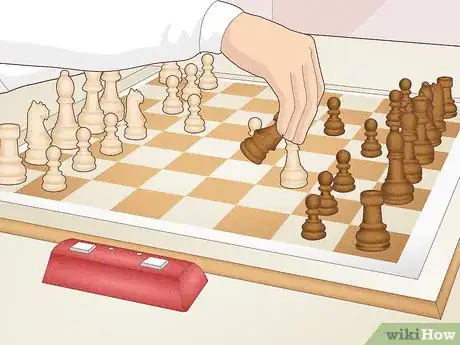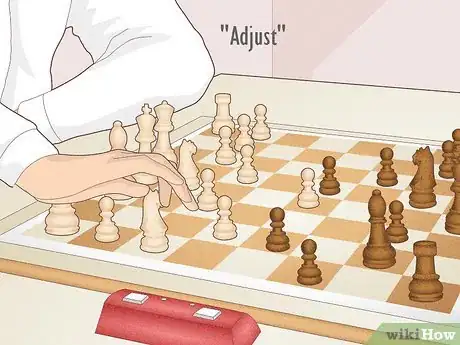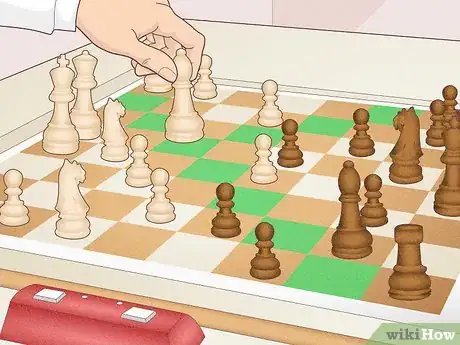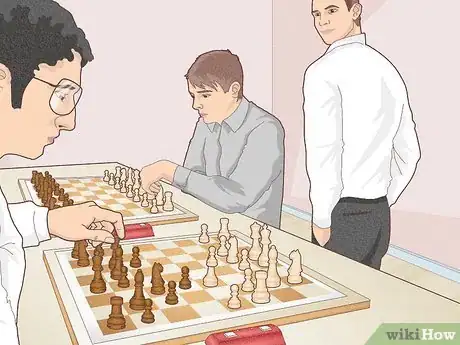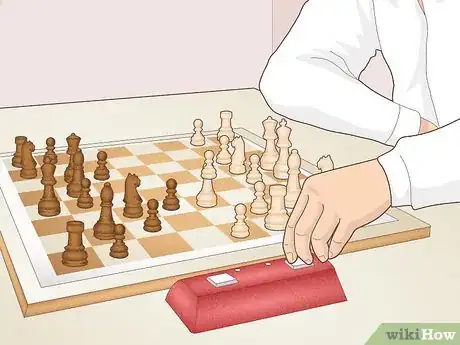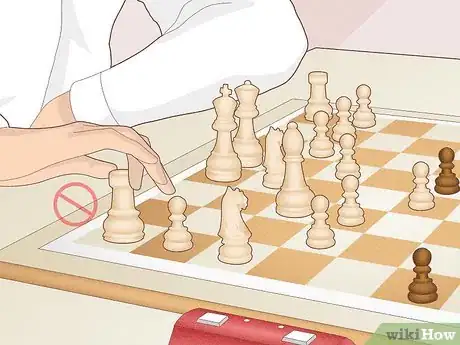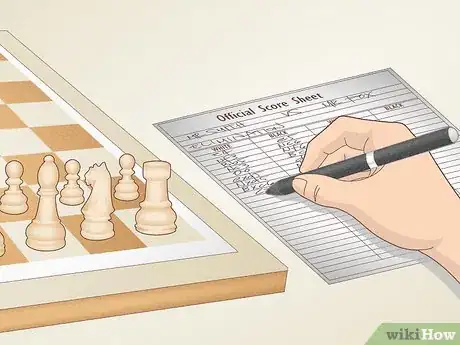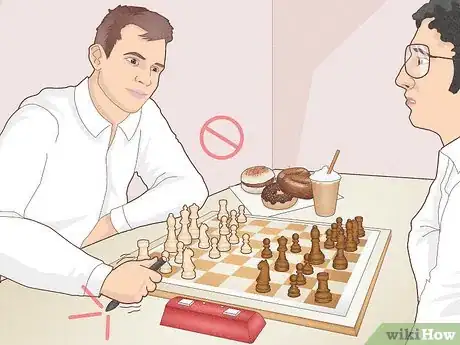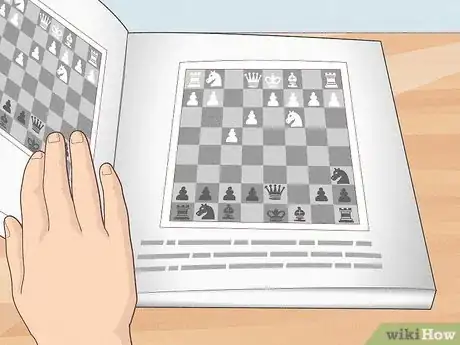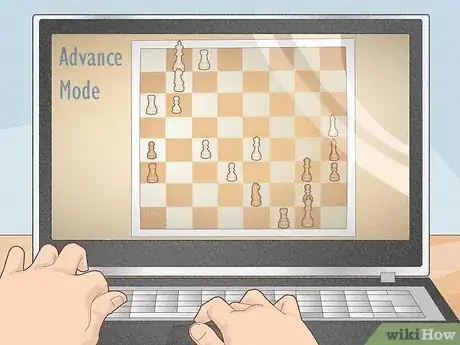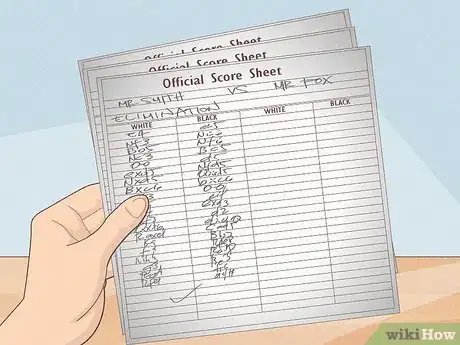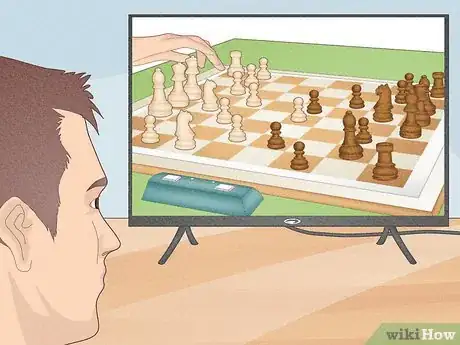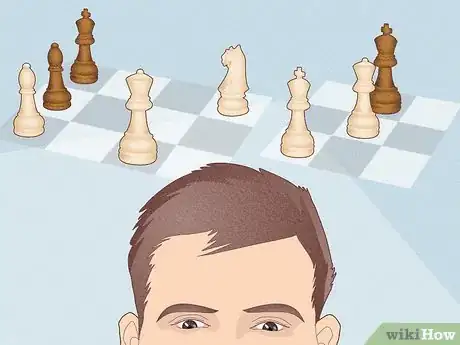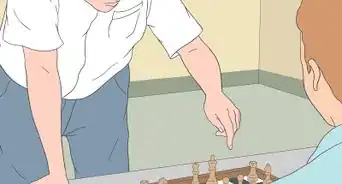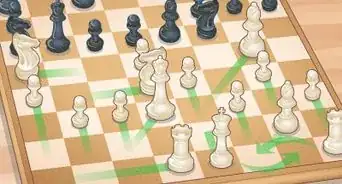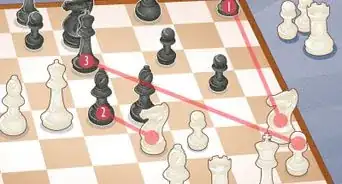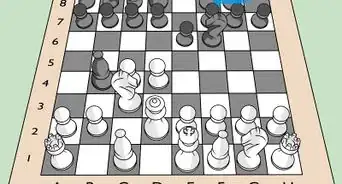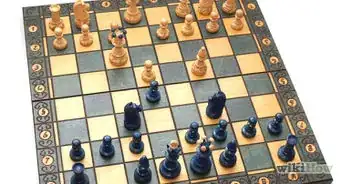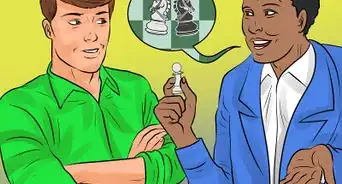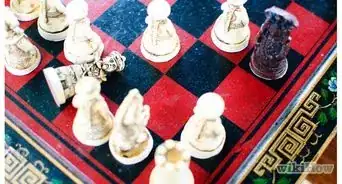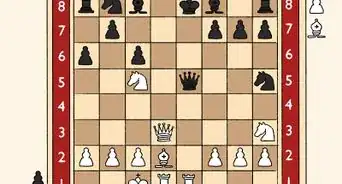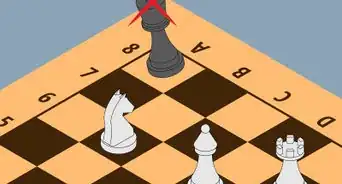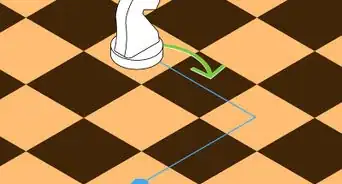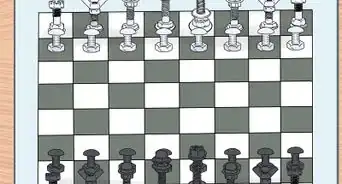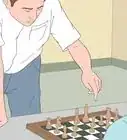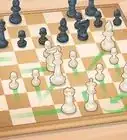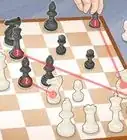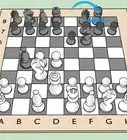This article was co-authored by Sahaj Grover. Sahaj Grover is a Chess Grandmaster, World Champion, and coach, who attained his Grandmaster title at the age of 16. He has been a World Junior Bronze Medalist, World U10 Champion, South African Open 2017 & 2018 Champion, and the Winner of the Arnold Classic 2018 & 2019. Sahaj is known for dynamic attacking skills and being an excellent endgame player.
There are 13 references cited in this article, which can be found at the bottom of the page.
This article has been viewed 17,547 times.
Chess is a delightful game and is known to improve memory and concentration skills. If you want to take your chess playing to the next level, try playing competitive chess! With so many rules, though, it can be difficult to know where to start, but fortunately, this wikiHow will provide a guide on how to play chess competitively.
Steps
Playing in Tournaments
-
1Sign up for a chess membership. To play in any rated tournaments, you'll need a chess membership provided by your country's chess federation.[1] You can usually sign up on their website, and if you have any difficulties, you can contact them for help.
- For the US, you should sign up at the USCF (US Chess Federation) website, and for Canada, it's the CFC (Canadian Federation of Chess).
- If you ever want to play in any international tournaments, you'll also need to register for FIDE. This can usually be done by playing in a FIDE-rated tournament.
-
2Start playing at a local chess club. If you want to get some experience with the ins and outs of tournament chess, your local chess club is a good place to start. A Google search of "chess clubs near me" will usually yield many results.
- Many chess clubs also host unrated tournaments which you can participate in.
- You can also choose to play at a chess club weekly. This is a good way to get some experience without taking too much time out of your day.
- There are likely many experienced players at the chess club. Feel free to ask around if you have any questions!
- If you're younger and still in school, you can join your school chess club, though the playing level will likely be lower and there will be fewer experienced players.
Advertisement -
3Play your first tournaments. Your federation's website likely has a list of upcoming tournaments along with the registration instructions for each. If you don't know how to register and/or want information on upcoming tournaments, a chess club is a good place to ask.
- Come to the tournament prepared. You will often need a chess set and clock unless it's a scholastic chess tournament.
- Once you arrive at the tournament, you'll usually need to confirm that you're there. Look for a sign-in table and, if you can't find it, ask around.[2]
- Enjoy the experience. Chess tournaments can be stressful, so it's helpful to foster a good relationship with them from the start.
- Stay to the end for the awards ceremony. You never know what you might get, especially if it's a scholastic chess tournament.
-
4Go international. Once you've gotten more experienced, you can ask about playing in international (FIDE) tournaments. The regulations vary with each country, so it's best to contact your country's chess federation for more information.
- One of the great aspects of playing chess competitively is traveling! Playing international tournaments is a rewarding experience in general, so be proud of yourself for coming this far!
-
5Aim for titles. Pretty much any chess player would agree that getting a title is one of the pinnacles of one's chess career. The possible titles are WCM (Women Candidate Master), CM (Candidate Master), WFM (Women FIDE Master), FM (FIDE Master), WIM (Women International Master), IM (International Master), WGM (Women Grandmaster), and GM (Grandmaster).[3]
- You can get titles from some specific tournaments. For details, check the FIDE website.
- After you earn the title, you must be at a certain FIDE rating (the exact rating varies based on the title). If you're not, the title will be awarded conditionally (i.e., you won't get the title until you reach the rating).
- If your rating drops after your title is awarded, you retain the title.
- This is not a rule, but it's easier to get titles when you're young, at youth tournaments.
Understanding Tournament Rules
Tournaments have different rules from casual chess. Knowing them can be the difference between a win and a loss.
-
1Know how to start a game. Shake hands, and the black player should start the clock.[4] Some people choose to say "Good luck" or "Have fun" when shaking hands, but this isn't mandatory. Usually, the black player can start the clock by pushing it on his side.
- If the clock is currently on the white player's side, the black player can start the clock by pressing the play/stop button in the center.
Tip: Make sure that you're playing the right color and the board is set up correctly.
-
2Call an arbiter if any issues arise. To do this, stop the clock and raise your hand. For example, if your opponent made an illegal move, stop the clock (press the play/stop button on it) and raise your hand to get the attention of an arbiter. They will come to your board and sort out the issue.
- This also applies in some tournaments when you've finished a game; if there's no way for you to record the result, it probably means you should ask an arbiter to.
-
3Know how to resign. You can resign by simply saying "I resign" and reaching to shake your opponent's hand. Alternatively, you can also congratulate your opponent by saying "Good game!" or "Well played!"
- If your opponent doesn't speak the same language as you or you don't want to speak, a fool-proof way to resign is by stopping the clock (you can usually do this by pressing the play/stop button in the middle of the clock) and reaching your hand out to shake your opponent's hand.
- You can also topple your king.[5]
- Be sure that you want to resign before doing so! If you're not sure, it never hurts to play for a few more moves.
-
4Learn how to offer a draw. Offer a draw by saying something along the lines of "Draw?" or "I offer a draw."[6] While asking for a draw, you can also reach your hand out. However, make sure not to reach your hand out without saying anything, as your opponent might think you're resigning!
- If your opponent doesn't speak the same language as you (this is usually the case in international tournaments), you can offer a draw by forming a cross with your two index fingers and positioning your hands so that your opponent can see the cross.
- Only offer a draw right after making a move, and don't offer one on your opponent's time.
- Don't pester your opponent with multiple draw offers. It's annoying, and in some cases, your opponent may complain about it to you or a tournament arbiter.
-
5Understand how to respond to a draw offer. Make sure you know if you want to accept or decline a draw offer first. To accept a draw offer, reach your hand out to shake your opponent's hand.[7] You can also say something like "I accept" or "Good game" while doing this. Alternatively, you can also nod your head while reaching your hand out.
- To decline a draw offer, you can say something like "No thanks" or "I decline." If you want to be more polite, you can try saying "Let's play for a bit more" or "Sorry, not right now."
- If your opponent doesn't speak the same language as you, or you don't want to speak, shaking your head will get the point across.
- To decline a draw offer, you can say something like "No thanks" or "I decline." If you want to be more polite, you can try saying "Let's play for a bit more" or "Sorry, not right now."
-
6Follow the touch-move rule. Touch-move is a rule which states that if you touch a piece, you have to move it, given that a legal move is possible using that piece. Additionally, if you touch an opponent's piece, you have to take it, given that it's possible to do that.[8] For this reason, avoid touching pieces for no reason, or you could be subject to this rule!
- If you make an illegal move, you have to move the piece you attempted to move if a legal move is possible.
- If you accidentally touch a piece, the rule may not apply, but it has to be clear that it was an accident.
-
7Adjust a piece properly. Reach your hand out and adjust the piece while saying "Adjust" or "I adjust."[9] Make sure to say "Adjust" before or right as you're adjusting your piece, or you could be subject to the touch-move rule (see above). This is because many players, when reaching their hand out to make a move, suddenly realize that the move is a bad one and say "Adjust." Even saying "Adjust" right as you're adjusting your piece is risky, so be careful!
- This rule does not apply before the game.
- If you want to adjust multiple pieces at once, you can say "I'm going to adjust some pieces" before going ahead and adjusting them.
- If your opponent doesn't speak the same language as you, you can follow this procedure as well. Your opponent will probably understand that you're trying to adjust a piece, given your actions and the fact that you said something. If you want to be extra clear, learn how to say "Adjust" or "I adjust" in your opponent's language. For example, in French, this would be "J'adoube."
-
8Know when and how to reverse a move. You can reverse a move only if your hand hasn't let go of the piece yet.[10] If your hand has let go of the piece, you can't take your move back. If your hand is still on the piece, you can change your mind (or choose to think a bit more about your move) by moving the piece back to its original position. Do keep in mind that the touch-move rule will apply, in this case.
- There have been cases when players have let go of their piece but quickly touched their piece again in an attempt to play a different move. Be attentive when your opponent makes a move, and be careful yourself.
-
9Get up and walk around if you want to. If you want to move your body around, feel free to get up and walk around the tournament hall. Many tournaments will also have food and drinks during a round. You can also choose to spectate other players' games to clear your mind a bit.
- Also, note that you are allowed to bring small foods and drinks to the board. For example, you can bring some dark chocolate and a water bottle with you. Just don't bring messy or large meals!
- Don't be gone for too long, though, as your opponent might move when you're not looking, causing you to lose time on your clock.
- Additionally, in some very rare cases, your opponent might get into mischief while you're gone, such as by moving some of the pieces so that they win. So, it might help to remember the board position before you get up.
- Try not to venture outside the tournament hall. This can cause your opponent and the tournament arbiter(s) to be suspicious. In some cases, it's outright banned.
Tip: Eat any snacks away from the board to avoid distracting your opponent. Also, snacks can emit a smell that your opponent may not necessarily like.
-
10Use the clock correctly. Press the clock right after playing your move with the same hand you used to play your move.[11] For example, if you moved a piece using your right hand, you would press the clock with your right hand. This is so that players don't use both hands to move extremely fast, especially when they don't have much time left on the clock.
- Some people don't like it when a person uses a piece they just captured to press the clock. It's better to use your hand to press it, just to be safe.
- Keep an eye on the clock; you don't want to run out of time! It may help to plan a time management strategy ahead of time.
- Keep in mind that some clocks have delays (a delay is time before your clock starts ticking for that move) or increments (an increment is time you gain after making a move), so take that into account when managing your time. Additionally, some tournaments give you extra time after the 40th move, 60th move, etc.
-
11Avoid common pitfalls when castling. Moving your king first and then your rook is the generally accepted way to castle.[12] Some tournaments may allow a player to use both hands to castle (one hand on the king and one hand on the rook), but try not to do that, just to be safe. What you should definitely avoid doing is moving your rook first; this would be counted as a rook move, and not castling.
- Some tournaments give warnings when you move your rook first, but don't rely on these.
-
12Record the moves using algebraic notation on the score sheet if the tournament provides them. You should generally fill in some information at the top, such as the name of the black and white players. Sometimes, a copy of the score sheet is given to the organizers of the tournament, so try not to write random things on your score sheet.
- Note that in most rapid tournaments, recording the moves on a score sheet is not mandatory.
- Write the move on the score sheet after it has been made.
- Players will sign each other's score sheets at the end of the game. If you want to appeal anything that happened during the game, don't sign the score sheet.
-
13Be civil to everyone in the playing hall. You aren't necessarily expected to be very kind, as many of the players are your opponents, after all! However, make sure to maintain a civil atmosphere.
- This means that you shouldn't talk unless it's related to the game, make loud noises, eat large meals, breathe on your opponent, look at them for a long time, etc.
- If your opponent is doing something that's annoying you (e.g., banging pieces on the board), you can talk to them about it in a civil manner. If your opponent doesn't speak the same language as you, call an arbiter for assistance translating what you want to say; oftentimes in international tournaments, there will be representatives for each country who can help translate what you want to say to their language.
- Additionally, it goes without saying, but don't cheat. This can result in a variety of punishments, such as a ban from tournaments, a fine, etc.
Improving Your Chess Skills
-
1Get a good coach. If you want to play competitive chess well, a good coach is essential to your progress. They will help improve your chess and analyze your games. Try to get a good coach as soon as possible to avoid forming bad habits.
- When choosing a coach, try to opt for international masters and grandmasters. Experience is also crucial. Try to choose a coach who has been playing chess for a long time.
- Also, make sure your coach fits your style. If your coach doesn't work well with you, then it doesn't matter what titles they have.
-
2Read chess books. Even when you're not at the board, reading an entertaining chess book can do wonders! You can find many books at a local chess shop. Choose one for your skill level and have fun!
- You can look at the reviews of each chess book before buying them. Try to buy bestsellers and books written by highly experienced chess players.
- You can also buy books written by a specific chess player if you like their playing style.
- It may also help to buy a book with practice problems so you can practice your tactics and strategies.
-
3Play many games.[13] Experience is crucial to becoming a great chess player. By playing many games, you'll gain this experience and will understand what you've learned much better. Even if there isn't a tournament coming up, playing games online is a great way to have fun and improve your skill.
- You can also find a partner to play games with. You can learn from your partner's strengths, and vice versa.
- Try to play games in tournament conditions. It'll help you when the real thing comes around.
-
4Analyze your games. This is just as important as playing games.[14] Analyzing your games helps you do better next time. You can also ask your coach to help you analyze your games.
- This is also why recording your moves down is important.
- You can also analyze your games with your sparring partner, if you have one.
- Try using a chess engine for assistance. Don't use it as your main tool, but it can help quickly detect mistakes in your play.
-
5Watch chess broadcasts. Much like football, you can also watch chess live. Oftentimes, chess24 provides a live broadcast of chess tournaments. Watching these will help you get a sense of how elite players play chess. Additionally, it's a fun experience to cheer for your favorite chess player.
- In addition to watching the chess game, for bigger tournaments like the World Chess Championships, there will be lots of commentaries available. Many top chess players commentate important events they aren't participating in, so this is also a good opportunity to see how top players analyze positions.
- This is a great way to have fun while learning a lot about the game.
- You can watch top players of chess playing the game and keep yourself up to date with the trends.
- Do as many tactics as possible. There is a saying that unlimited positions are possible in chess, but the patterns are more or less limited.
- A dynamic player should be familiar with a Sicilian defense. A positional player should know positional strategies.
-
6Improve your mindset. Especially since chess is a mind game, your mindset is important to success. There are a few things to keep in mind when playing a game:
- Play for a win. Even when a draw is enough to win a tournament, you should always play for a win. Playing for a draw can cause you to lose fairly quickly.
- Understand that rating isn't everything. Though it can be an incentive and make you feel good when you reach a milestone, don't sweat it too much. Having fun and improving yourself is most important, and rating will come with time.
- Be confident and sit up straight in your chair. Being confident can have a psychological effect on your opponent, making them more prone to making mistakes.
- Most importantly, understand that it's not the end of the world when you lose. Review the game, and know that there's always next time.
Community Q&A
-
QuestionIs this the same for checkers?
 FlowerPower 💖Community AnswerCompetitive checkers is real, and playing competitive checkers can be similar to playing competitive chess. However, competitive checkers is less commonplace than competitive chess, so it can be harder to find tournaments to play, find competitive resources, and gain any prizes/recognition for it.
FlowerPower 💖Community AnswerCompetitive checkers is real, and playing competitive checkers can be similar to playing competitive chess. However, competitive checkers is less commonplace than competitive chess, so it can be harder to find tournaments to play, find competitive resources, and gain any prizes/recognition for it. -
QuestionWhat if you cannot play chess or are not good at it?
 FlowerPower 💖Community AnswerIt's never too late to start learning and improving your chess, especially because chess is a mind game, not a physical one! So give chess a shot, and see if you like it or not.
FlowerPower 💖Community AnswerIt's never too late to start learning and improving your chess, especially because chess is a mind game, not a physical one! So give chess a shot, and see if you like it or not. -
QuestionIs bribing my opponent to let me win a viable chess stategy?
 FlowerPower 💖Community AnswerNo, this is usually considered cheating. Doing this in a FIDE-rated tournament is also a violation of the FIDE Code of Ethics.
FlowerPower 💖Community AnswerNo, this is usually considered cheating. Doing this in a FIDE-rated tournament is also a violation of the FIDE Code of Ethics.
Warnings
- Be careful during promotion; in some tournaments, promoting a pawn to an upside-down rook to mean a queen is illegal and can result in the promoted piece officially being a rook.⧼thumbs_response⧽
References
- ↑ https://www.thesprucecrafts.com/your-first-chess-tournament-611569
- ↑ https://www.stormontkingschess.com/first-timers-guide-to-chess-tournaments/
- ↑ https://handbook.fide.com/chapter/B01Regulations2017
- ↑ https://herculeschess.com/how-chess-tournaments-work/
- ↑ https://www.dummies.com/games/chess/chess-tournament-etiquette/
- ↑ https://chessdelta.com/how-offer-draw-and-accept-draw-in-chess/
- ↑ https://chessdelta.com/how-offer-draw-and-accept-draw-in-chess/
- ↑ https://www.fide.com/FIDE/handbook/LawsOfChess.pdf
- ↑ http://www.uschess.org/docs/gov/chessrules/US_Chess_Rule_Book-%20Online_Only_Edition_v7.1-1.2.11-7.19.19.pdf
- ↑ https://chessdelta.com/take-back-a-move-in-chess/
- ↑ https://www.chesskid.com/article/view/a-beginners-guide-to-chess-clocks
- ↑ https://www.chessable.com/blog/how-to-castle-in-chess/
- ↑ https://herculeschess.com/how-to-get-better-at-chess/
- ↑ https://www.chessmasterschool.com/blog/analyze-chess-games.html
About This Article
To start playing competitive chess, sign up for a chess membership provided by your country's chess federation. Start gaining competitive experience by playing at a chess club and playing at your first tournaments. Pay attention to competitive chess rules, as the rules of competitive chess are different from that of casual chess. Once you've gotten more experienced, you can try playing in bigger and international tournaments. For more information on competitive chess, scroll down!
